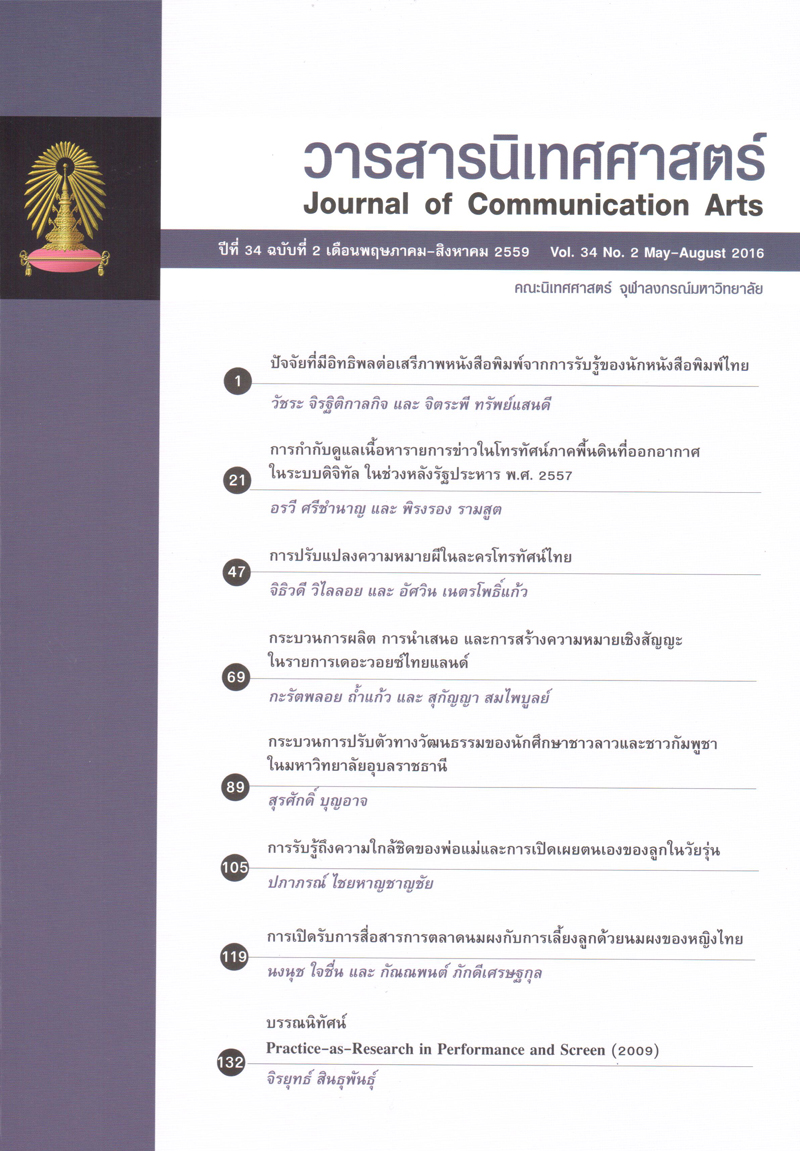กระบวนการปรับตัวทางวัฒนธรรมของนักศึกษาชาวลาวและชาวกัมพูชาในมหาวิทยาลัยอุบลราชธานี
Main Article Content
Abstract
งานวิจัยนี้มีวัตถุประสงค์เพื่อศึกษาถึงกระบวนการปรับตัวทางวัฒนธรรม องค์ประกอบที่มีส่วนช่วยในการปรับตัวทางวัฒนธรรม และแนวทางในการปรับตัวทางวัฒนธรรมใหม่ของนักศึกษาชาวลาวและชาวกัมพูชาในมหาวิทยาลัยอุบลราชธานี รูปแบบงานวิจัยเป็นเชิงปริมาณและคุณภาพ มีการสำรวจด้วยแบบสอบถามและการสัมภาษณ์เชิงลึก กลุ่มตัวอย่าง คือ 1) กลุ่มนักศึกษาชาวลาวและชาวกัมพูชา จำนวน 25 คน และ 2) กลุ่มผู้บริหาร คณาจารย์ และบุคลากร จำนวน 5 คน ทั้งหมด 30 คน ผลการวิจัยพบว่า
1. กระบวนการปรับตัวทางวัฒนธรรม ภาพรวมพบว่าส่วนใหญ่มีการรักษาอัตลักษณ์ของกลุ่มชาติพันธุ์ตนเองไว้ และมีการปรับรับเอาวัฒนธรรมไทยมาด้วย ส่วนระดับขั้นตอนในการปรับตัวของนักศึกษาชาวลาว พบว่าโดยส่วนใหญ่เมื่ออยู่เมืองไทยมาสักระยะหนึ่ง รู้สึกปรับตัวได้มากขึ้น โดยเฉพาะในเรื่องของการใช้ภาษาไทยทำให้นักศึกษาสื่อสารได้อย่างมั่นใจ และรู้สึกว่าประเทศไทยเป็นเสมือนบ้านของตนเอง ส่วนระดับขั้นตอนในการปรับตัวของนักศึกษาชาวกัมพูชา พบว่าโดยส่วนใหญ่เพิ่งเข้ามาอยู่ในประเทศไทยได้ไม่นาน จึงรู้สึกตื่นเต้นถึงความแปลกใหม่ของสภาพแวดล้อม สถานการณ์ใหม่ๆ ทั้งวัฒนธรรม ผู้คน และการบริโภค
2. องค์ประกอบที่มีส่วนช่วยในการปรับตัวทางวัฒนธรรม ได้แก่ 1) พื้นฐาน สิ่งที่ติดตัวและเตรียมตัวไว้ล่วงหน้า ได้แก่ ภูมิหลัง บุคลิกนิสัย ความคาดหวัง ระดับการเตรียมตัว และทักษะการสื่อสารและการใช้ภาษา 2) สภาพแวดล้อมของสังคมและประเทศเจ้าบ้าน ได้แก่ ลักษณะวัฒนธรรมไทยที่มีความผ่อนปรน ยืดหยุ่น ความประทับใจแรกพบต่อวัฒนธรรมไทย การช่วยเหลือและสนับสนุนจากกลุ่มคนในสังคมไทย การรับรองอย่างเป็นทางการของทางหน่วยงานรัฐบาลไทย โอกาสของการทำกิจกรรมร่วมกัน และความถี่ในการสื่อสารกับชาวไทย 3) บทบาทของสื่อมวลชน เพื่อเป็นแหล่งข้อมูล และเป็นที่ผ่อนคลายอารมณ์ ซึ่งองค์ประกอบเหล่านี้มีส่วนช่วยให้นักศึกษาชาวลาวและชาวกัมพูชาแต่ละคนปรับตัวทางวัฒนธรรมได้แตกต่างกัน
3. แนวทางในการปรับตัวทางวัฒนธรรมใหม่ ได้แก่ 1) การเรียนรู้ศึกษาข้อมูลด้วยตนเองผ่านการสืบค้นข้อมูลทางอินเทอร์เน็ต ได้แก่ ข้อมูลเกี่ยวกับมหาวิทยาลัย ที่พักอาศัย และการใช้ภาษาไทย 2) การมีบุคคลต่างวัฒนธรรมในฐานะคู่สื่อสาร คือ สื่อบุคคล หน่วยงานที่นักศึกษาเปิดรับ ผลการศึกษาพบว่านักศึกษาชาวลาวเลือกสื่อสารกับเพื่อนชาวไทยในเรื่องการเรียน และสื่อสารกับเพื่อนชาวลาวในเรื่องการใช้ชีวิต ส่วนนักศึกษาชาวกัมพูชามีความสนิทสนมและสื่อสารกันเฉพาะภายในกลุ่มของตนมากกว่า จึงทำให้มีเวลาไม่มากพอสำหรับโอกาสในการเรียนรู้วัฒนธรรมไทย ส่วนการปฏิสัมพันธ์กับอาจารย์และบุคลากรของหน่วยงานวิเทศสัมพันธ์ จะมีวัตถุประสงค์เพื่อช่วยในการปรับตัวทั้งในเรื่องการเรียน และการใช้ชีวิต 3) การเปิดรับสื่อมวลชนไทย ได้แก่ หนังสือพิมพ์ โทรทัศน์ ละคร เพลง ภาพยนตร์ และสื่อใหม่ เพื่อใช้เป็นแนวทางในการปรับตัว เป็นข้อมูลการเรียนรู้ทางด้านวัฒนธรรมและให้ความเพลิดเพลิน
Intercultural Adaptation Process of Laos and Cambodian Students in Ubon Ratchathani University
The research aims to investigate intercultural adaptation process, factors supporting Laotian and Cambodian students’ strategies in adapting to new culture while studying in Ubon Ratchathani University. Both quantitative and qualitative methods, namely survey questionnaires and in-depth interviews, were used in this research. There were 30 key informants in this study, including 1) twenty-five Laotian and Cambodian students and 2) five university administrators, teachers and staff. The research results are as follows:
1. Overall, the intercultural adaptation process of Laotian and Cambodian students mostly indicated preservation of one’s own ethnic identity; at the same time, there was evidence of bicultural identity as they gradually assimilated into Thai culture. Concerning the stages of cultural adaptation, after a certain period of their stay in Thailand, the Laotian students showed a great deal of cultural adaptation, particularly in Thai language communication which also increased their self-confidence and made them feel as if Thailand were their own home. However, the Cambodian students’ stages of cultural adaptation differed from those of the Laotian students because they had stayed in Thailand in a shorter period of time. Thus, they were drawn into intriguing environment and new experiences, for example, culture, people, and food.
2. The factors assisting Laotian and Cambodian students’ cultural adaptation were: 1) predisposition or individual condition and identity such as background, personality, expectation, levels of preparation for the new place, language and communicative skills, 2) social condition of the host environment, especially the flexible and compromising aspects of Thai culture, first impression of group support from Thai people, institutional legitimization of new identity, opportunities in cooperative tasks, and frequent communication with Thai people, and 3) the important role of mass media in providing the students with information and relaxation resources, all of which partially helped Laotian and Cambodian students in adapting to the new culture at different levels.
3. Students’ strategies in adapting to new culture were as follows: 1) Self-learning via web-based research, for example, information regarding Ubon Ratchathani University, accommodation, and Thai language usage, 2) The results revealed Laotian students preferred interacting with Thai students in terms of study and more likely to shared life styles with Laotian students, whereas Cambodian students showed more interaction among people in their own group. Consequently, the Cambodian students had less opportunity to learn Thai cultures. The students’ interaction with others, and with teachers and staff of Foreign Affair Department was for the purposes of study and living guidance. (3) Exposure to Thai mass media such as newspapers, television programs and series, songs, movies and new media, which provided students with ways to helped them adapt themselves to new culture, gain information for cultural learning, and relax.


